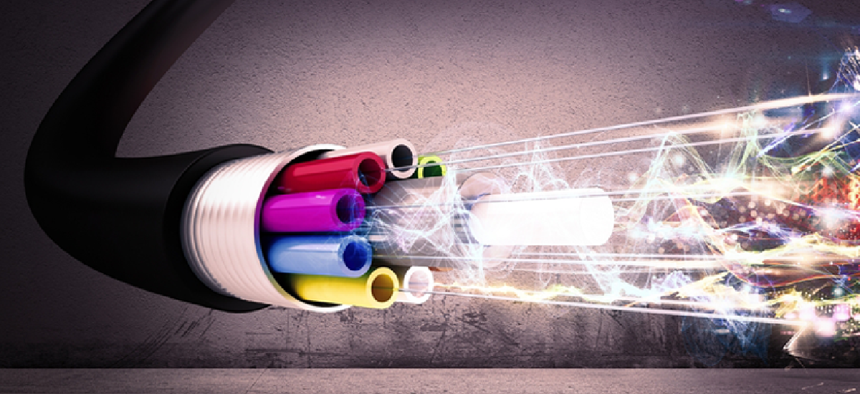A quantum response to next-gen cyber threats

Quantum Xchange sends quantum-generated cryptographic keys over fiber-optic cable to securely transfer critical data.
Computer security experts have sounded alarms that the power of quantum computers may make it possible to crack current advanced encryption standards (AES) that are used to protect highly sensitive data.
The key vulnerability of current encryption standards -- including both the 256-bit AES and the 3,072-bit RSA -- lies not in their being uncrackable, but rather in the fact that cracking them would take too much time and resources to be feasible.
The massive increases in processing power that quantum computers could provide, however, have cybersecurity experts warning that existing encryption standards could soon be worthless.
Quantum Xchange, a communications company based in Bethesda, Md., says it has the answer to securely transferring critical data. The company is currently testing the first quantum-secured network in the United States -- dubbed Phio -- which carries quantum cryptographic keys over fiber-optic cable for organizations that are securely transferring critical data. The first leg of the distribution network connects New York City to New Jersey.
The company's quantum encryption works like existing encryption standards. An encryption key -- which in current standards is generated by multiplying sets of prime numbers -- is used to encode a file for transmission. When the recipients receive the encrypted file, they need the correct encryption key to decrypt it.
What's different about Quantum Xchange’s network is that it uses quantum technology to generate truly random encryption keys. First, Phio uses a random quantum number generator to create keys by measuring the properties of streaming photons -- primarily their polarization or phase modulation. “If it's a vertical polarization you might say it's a one, and if it's horizontal you might say it's a zero,” Quantum Xchange CEO John Prisco said.
The Phio system also uses photons to send the keys over fiber-optic cable. The major limitation of using photons for sending keys, however, is that they have a working distance of only 80 to 100 kilometers, beyond which the quantum properties of the photon may have changed and be unreadable to the receiver.
Quantum Xchange’s solution is to employ “trusted nodes” -- devices that receive the key before it degrades and generate a new key using the same random quantum number generator and then send the data on its way.
“You take the key material that has come to the end of the 80-km span, and you encrypt it with the second quantum key and then retransmit that result to the next node,” Prisco said. “You do the same thing until you reach the distance that you are interested in, and eventually you can retrieve the original key.”
While inside the trusted node, the transmission is very briefly in an unencrypted state and can be read as plain text. That makes securing the trusted nodes a priority.
The system is designed so that if hackers “were to go in there and rip the cover off of the trusted node, [they'd find] a secure memory-tempered detection module that would zero out all the key material,” Prisco said. He added that the devices themselves are placed in guarded data centers.
Quantum Xchange’s network also has built-in protections against data cables being tapped. “We will send 1 million photons down the fiber, and we will compose a key of only 10 percent of those photons,” Pricso said. Somebody trying to break into the system would have to know which ones were being used for they key. “You would have to guess the polarization or the phase of those 900,000 protons that I discarded, one after another every time,” he said. “That would be like flipping a coin 900,000 times and always getting heads or tails right.”
Quantum encryption isn’t necessarily tied to fiber optics. Prisco said it would also be feasible to uses the same techniques to transmit via satellites.
For now, Prisco said the United States is playing catch-up in developing quantum encryption systems. “There are no primary manufacturers in the United States,” he said, noting that quantum key engines are manufactured in Europe and Asia. China in particular has been working hard on developing secure quantum networks, he said.
“If you think of quantum computers as an offensive weapon as it pertains to cryptography, which it is, what will the defensive weapon be?” Prisco asked. “The defensive weapon would be quantum key distribution. We've got a little bit of catching up to do," he said. "I think it's probably at least as important as the space race of the 1960s and perhaps a lot more important to the security of our country.”
NEXT STORY: Is your VPN secure?





